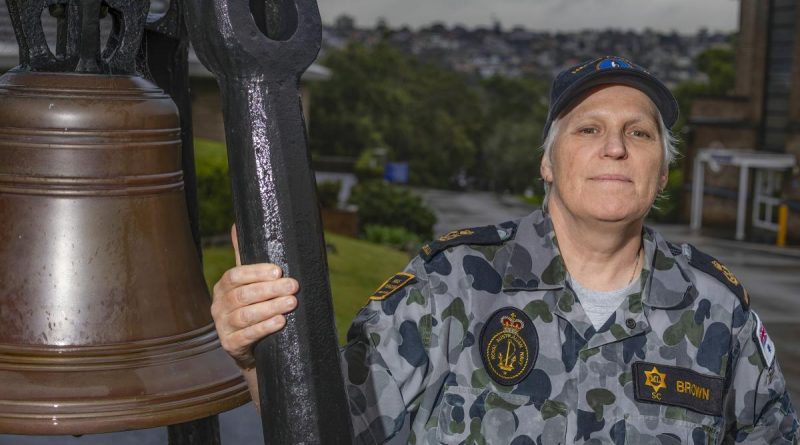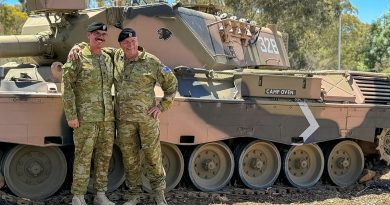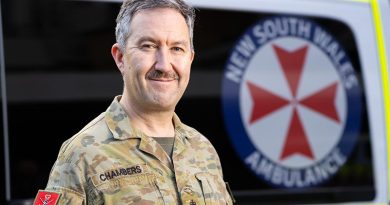Attitudes changed over long career

Chief Petty Officer Sharon Brown has witnessed a significant change in attitude towards women in her 42-and-a-half-year naval career.
: Chief Petty Officer Sharon Brown stands next to the historic HMAS Penguin bell in Sydney. Story by Corporal Veronica O’Hara. Photo by Able Seaman Benjamin Ricketts.
In 1980, Chief Petty Officer Brown was in the first cohort of Women’s Royal Australian Naval Service (WRANS) recruits to train and graduate with their male counterparts.
WRANS merged into the Royal Australian Navy in 1984 but women could not serve at sea until the following year. Even then, it was optional and excluded combat duties.
Chief Petty Officer Brown’s first sea-going experience was in 1985 in HMAS Jervis Bay GT203, a training and troop transport vessel.
“Prior to this, any sea posting opportunity was voluntary, so it was a major step towards fulfilling permanent sea-going obligations,” Chief Petty Officer Brown said.
“It was also my first experience of life at sea as a member of a ship’s company.”
Nearly a decade later, she was one of the first females posted to a warship, serving in HMAS Sydney from 1992-1994.
One of Chief Petty Officer Brown’s career highlights was meeting Prince Philip during a winter ceremonial parade at HMS Raleigh while she was on Exercise Long Look 1997.
That meeting only lasted a few minutes, but Chief Petty Officer Brown said the prince was very interested in the jobs of the RAN personnel and why they were at Raleigh.
Two years ago, Chief Petty Officer Brown was part of a project team involved in selling two guided-missile frigates to the Chilean Navy.
“It was a great way to experience how their supply chain works, which is totally different from the Australian Navy,” she said.
“This was one of the most rewarding experiences, as it was sort of my last hurrah before retiring.”
Growing up in the Melbourne suburb of Footscray, Chief Petty Officer Brown worked in catering after completing grade 12 at school.
Seeking a challenge, she applied to study physical education for the three military services.
She enlisted in the WRANS as a stores victualler but changed to stores naval when the two trade branches amalgamated in 1992. The trade is now known as maritime logistics – supply chain.
Chief Petty Officer Brown was attracted to Navy because of the job stability, steady pay cheque and other benefits like training.
“Navy is more of a business now than it was when I first joined – instead of working nine to five, it’s 0800 to 1600 with 24/7 recall,” she said.
“The days are still long but the benefits of allowances, medical, dental, etc, and the rewards, such as helping the community, are good.
“No matter who you are, we are part of a unique community that has an unbroken, silent bond and special camaraderie.”
Chief Petty Officer Brown said there were plenty of opportunities in Navy, but her advice to anyone considering joining was to choose wisely.
“Do not give up on your goals, and don’t be afraid to accept a challenge – you might regret it later if you don’t take it,” she said.
“Sometimes we make wrong choices to get to the right place. We all make mistakes but, if we dwell on the mistakes, we may miss the miracles.”
Chief Petty Officer Brown will retire in June. She plans to travel Australia and the world and do geocaching.
She also hopes to publish a nearly completed travel book on the preparation required to walk the 800km Camino de Santiago pilgrimage route across northern Spain, also known as the Way of St James.
.
.

.
.





